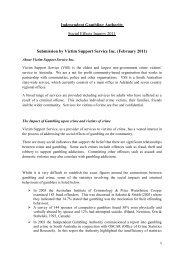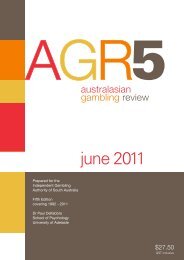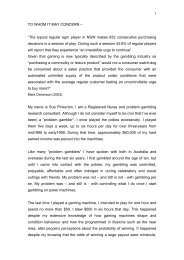SAJC--report of inquiry into suitability of close associates - Portellos ...
SAJC--report of inquiry into suitability of close associates - Portellos ...
SAJC--report of inquiry into suitability of close associates - Portellos ...
Create successful ePaper yourself
Turn your PDF publications into a flip-book with our unique Google optimized e-Paper software.
Inquiry <strong>into</strong> the <strong>suitability</strong> <strong>of</strong> certain <strong>close</strong> <strong>associates</strong> <strong>of</strong> the<br />
South Australian Jockey Club<br />
Report<br />
Under the <strong>SAJC</strong>’s licensing arrangements (described in more detail below, at page 4),<br />
the election <strong>of</strong> board members is subject to them being approved by the Authority.<br />
The approval criterion is <strong>suitability</strong>.<br />
In the normal course, this process routinely involves a police check and, should<br />
anything be noted, an interview.<br />
However, noting the circumstances in which the 2009 election had been called, the<br />
involvement as candidates <strong>of</strong> a number <strong>of</strong> people who had been candidates at the 2008<br />
election and some continuing controversy over the election process, the Authority<br />
determined to hold an <strong>inquiry</strong> to enable it to form a view as to the <strong>suitability</strong> <strong>of</strong> those<br />
elected.<br />
The Authority made this determination prior to the completion <strong>of</strong> the electoral<br />
process.<br />
Following examination <strong>of</strong> the candidates elected and the principal actors in the events<br />
<strong>of</strong> 2008, the Authority had sufficient evidence to enable it to approve the board<br />
members-elect (as explained in the conclusions section on page 69). This approval<br />
was advised to the <strong>SAJC</strong> on 15 June 2009, 6 weeks after the election result was<br />
announced. This has enabled the new <strong>SAJC</strong> board to move on with its normal<br />
business processes in a timely way.<br />
As some matters which became apparent in the course <strong>of</strong> the examinations required<br />
explanation before the Authority could acquit its statutory responsibility to <strong>report</strong>,<br />
further examinations were conducted. The Authority has concluded the <strong>inquiry</strong><br />
process by the delivery <strong>of</strong> this <strong>report</strong> to the Minister for Gambling on 23 July 2010.<br />
2.2 Statutory background—<strong>report</strong> <strong>of</strong> exercise <strong>of</strong> <strong>inquiry</strong> powers<br />
In the legislative scheme for commercial gambling in South Australia, particular<br />
forms <strong>of</strong> commercial gambling are authorised by individual statutes with regulatory<br />
functions being undertaken by the Independent Gambling Authority and the Liquor<br />
and Gambling Commissioner. The Authority is established under the Independent<br />
Gambling Authority Act 1995 which, in addition to setting out its functions and<br />
powers, gives it certain coercive evidence gather powers. These are extracted in<br />
Appendix B.<br />
The powers include the ability to require people to attend under summons for the<br />
purpose <strong>of</strong> giving evidence under oath or affirmation. Those giving evidence must<br />
answer the Authority’s questions, even when the answer might tend to incriminate or<br />
when it would require the disclosure <strong>of</strong> information otherwise protected by legal<br />
pr<strong>of</strong>ession privilege. (When privilege is claimed, the answers cannot be used in other<br />
proceedings.)<br />
Similar powers are available to commissions and boards <strong>of</strong> <strong>inquiry</strong>, as well as to the<br />
Authority’s regulatory counterparts in other jurisdictions. They enable the Authority<br />
to require people to dis<strong>close</strong> things which a court would not require in civil,<br />
administrative or criminal proceedings. The existence <strong>of</strong> these powers means that, in<br />
the event <strong>of</strong> their being a conflict between the public interest in the proper regulation<br />
3





